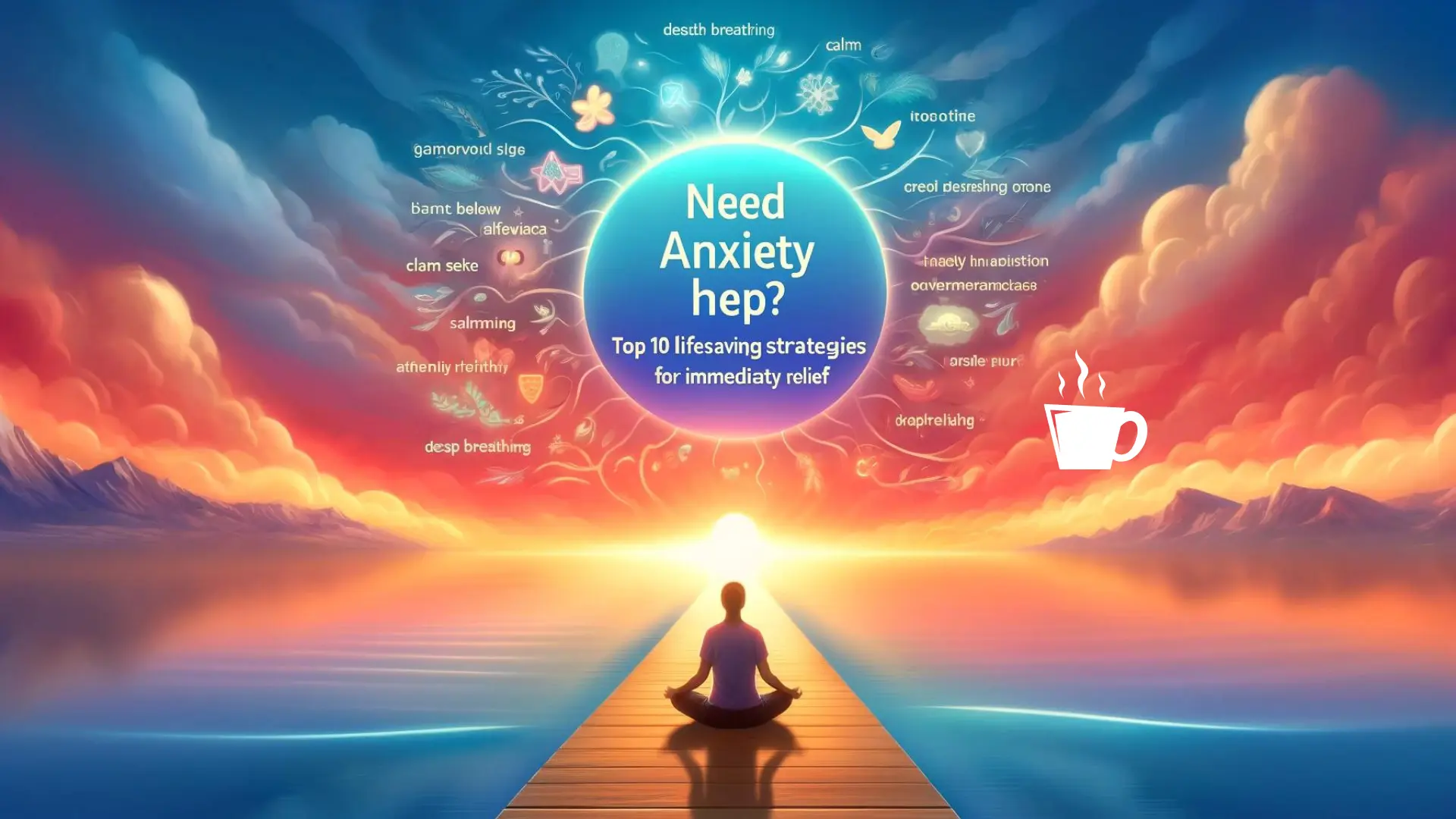Physical Address
304 North Cardinal St.
Dorchester Center, MA 02124

In our modern, fast-paced world, anxiety has become a common companion for many. It sneaks into our lives, triggered by a myriad of factors ranging from work pressures to personal challenges, casting a shadow over our daily experiences. Recognizing the signs of anxiety is the first step towards seeking effective relief, a journey that begins with understanding the power of simple, immediate strategies to combat this pervasive emotion.
Thankfully, relief from anxiety doesn’t always require extensive interventions. Small, practical steps can offer significant respite, empowering individuals to regain control over their mental well-being. This article delves into ten straightforward strategies that provide immediate relief from anxiety, guiding readers towards a path of tranquility and resilience.

Breathing exercises stand as a beacon of immediate relief for those grappling with anxiety. The 4-7-8 technique, a simple yet profound method, offers a quick way to calm the mind and body. By focusing on your breath, you can momentarily distance yourself from the stressors that trigger anxiety, allowing for a moment of peace in a turbulent sea of thoughts.
This technique works by engaging the parasympathetic nervous system, which helps to slow the heart rate and lower blood pressure, providing a natural counterbalance to the body’s stress response. Inhaling for four seconds, holding for seven, and exhaling for eight, this pattern encourages a deep, rhythmic breathing that fosters relaxation and a sense of calm.
Regular practice of the 4-7-8 breathing can not only offer instant relief in anxious moments but also contribute to a long-term strategy for managing stress. It’s a reminder that sometimes, the simplest actions, like breathing, hold the key to navigating life’s complexities with grace and resilience.

Physical activity is a potent antidote to anxiety, harnessing the body’s own biochemistry to combat the effects of stress. Engaging in exercise, even for short periods, can trigger the release of endorphins, the body’s natural painkillers and mood elevators. This biochemical reaction not only reduces pain and discomfort but also momentarily lifts the heavy cloak of anxiety, offering a breath of fresh air to those suffocated by their worries.
The beauty of using exercise as a strategy for immediate anxiety relief lies in its versatility. Whether it’s a brisk walk in the park, a quick session of yoga, or a few minutes of stretching, any form of physical activity can be beneficial. These activities not only distract the mind from stressors but also promote a healthier physical state, which, in turn, can enhance overall mood and well-being.
Regular incorporation of physical activity into one’s daily routine serves as a preventive measure, building a foundation of resilience against future stress. This proactive approach to managing anxiety underscores the critical link between physical health and mental health, reminding us of the power we have to influence our own psychological state through physical means.

Nutrition plays a critical role in managing anxiety, as the foods we consume can significantly influence our mental health. A diet rich in whole foods, such as vegetables, fruits, lean proteins, and whole grains, can provide the essential nutrients necessary for maintaining balanced brain chemistry. This balance is crucial for regulating mood and reducing susceptibility to anxiety. Conversely, consuming excessive amounts of processed foods, caffeine, and sugar can exacerbate feelings of anxiousness, creating a cycle that’s hard to break.
Incorporating foods that are high in omega-3 fatty acids, such as salmon and flaxseeds, can be particularly beneficial. These nutrients support brain health, promoting functions that are critical for mood regulation and stress reduction. Additionally, staying hydrated and limiting intake of stimulants like caffeine can help stabilize mood fluctuations that contribute to anxiety.
Creating a mindful eating strategy is not just about what we eat but also how we eat. Eating slowly and without distractions allows for better digestion and absorption of nutrients, further supporting mental health. By making informed choices about our diet, we can influence our mental well-being in profound ways, using nutrition as a tool to combat anxiety from within.

Establishing a routine is akin to laying down a map for daily life, offering a sense of predictability and control amidst the chaos that can trigger anxiety. By setting regular times for waking up, eating, working, and engaging in leisure activities, individuals can create a stable framework that supports mental well-being. This structure helps minimize the uncertainty that often feeds anxious thoughts, providing a comforting rhythm to the day.
Routines also encourage healthier habits, such as regular exercise and sufficient sleep, which have direct benefits on anxiety levels. When the body knows what to expect, it can regulate its internal processes more efficiently, leading to improved sleep patterns, better stress management, and overall a more balanced emotional state. These benefits collectively create a buffer against the unpredictability of life, making anxiety less overwhelming.
Furthermore, the act of following a routine itself can be therapeutic. The sense of accomplishment from completing daily tasks, no matter how small, can boost self-esteem and provide a sense of purpose. This positive feedback loop reinforces the routine, making it a cornerstone of a holistic approach to managing anxiety.

Limiting screen time, especially in the hours leading up to bedtime, plays a crucial role in mitigating anxiety. Screens emit blue light, which can interfere with the body’s natural sleep-wake cycle, making it harder to fall asleep and potentially exacerbating anxiety symptoms. By reducing exposure to screens, individuals can improve their sleep quality, which is closely linked to mental health and well-being.
Engaging in screen-free activities before bed, such as reading a book or practicing meditation, can help the mind unwind and prepare for sleep. These activities not only serve as a break from the constant influx of information and stimuli we receive from screens but also promote relaxation. This shift away from screens to more calming activities can significantly reduce anxiety levels, fostering a peaceful state of mind conducive to restful sleep.
Moreover, being mindful about screen time during the day can also reduce anxiety. Instead of scrolling through social media or reading news that may trigger stress, choosing to spend time outdoors or with loved ones can provide meaningful engagement and relaxation, further contributing to anxiety relief. This mindful approach to screen use can help cultivate a more balanced and less anxious lifestyle.

The intricate relationship between sleep and anxiety is well-documented, with each significantly influencing the other. Lack of adequate sleep can heighten anxiety levels, creating a cycle that’s hard to break. Ensuring a regular sleep schedule and creating a conducive sleep environment can pave the way for improved mental health. A consistent bedtime routine, avoiding caffeine and heavy meals before sleep, and ensuring the sleeping area is comfortable and free from distractions can all contribute to a more restful night.
Good sleep hygiene practices are essential for those dealing with anxiety. Engaging in relaxation techniques before bed, such as deep breathing, meditation, or gentle yoga, can help calm the mind and prepare the body for sleep. These practices not only ease the transition into sleep but also improve the quality of sleep, reducing the likelihood of waking up feeling anxious.
Furthermore, understanding the role of sleep in regulating emotions and cognitive processes highlights its importance in managing anxiety. A well-rested brain is better equipped to deal with stress, process emotions, and maintain psychological balance. By prioritizing sleep, individuals can create a strong foundation for mental well-being, significantly reducing the impact of anxiety on their daily lives.

Mindfulness exercises offer a potent remedy for the immediate relief of anxiety symptoms, grounding individuals in the present moment and diminishing the power of anxious thoughts. Practices such as guided meditation, focused breathing, and body scans can redirect attention away from stressors, allowing for a sense of calm to emerge. By anchoring awareness in the here and now, mindfulness exercises help break the cycle of worry that often fuels anxiety.
Engaging in mindfulness also fosters a deeper connection with oneself, enhancing self-awareness and promoting emotional regulation. Through regular practice, individuals can develop a more compassionate and non-judgmental stance towards their thoughts and feelings. This shift in perspective can significantly reduce the intensity of anxiety over time, offering not just immediate relief but also long-term resilience against stress.
Moreover, mindfulness can be practiced anywhere and anytime, making it an accessible tool for managing anxiety. Whether it’s during a break at work, the start of the day, or before sleep, incorporating mindfulness exercises into daily routines can provide a safe harbor in times of emotional turmoil, steering the mind towards peace and stability.

Journaling serves as a therapeutic outlet for those battling anxiety, providing a space to express thoughts and feelings that may be too difficult to articulate verbally. Writing down worries and fears can help to externalize them, making them seem more manageable and less intimidating. This process of reflection can illuminate patterns in thinking and behavior, offering insights into triggers and coping mechanisms that might not be immediately apparent.
The act of journaling fosters a mindful approach to dealing with anxiety, encouraging individuals to engage with their thoughts and feelings in the present moment. This can help to slow down the racing mind, bringing a sense of clarity and calm. The physical act of writing can also be meditative, further contributing to its anxiety-reducing effects.
Furthermore, journaling creates a personal record of struggles and successes, serving as a tool for tracking progress over time. Reviewing past entries can offer encouragement and perspective, reminding individuals of their resilience and ability to navigate through challenging periods. This historical account can be a source of motivation and a reminder of the power within to overcome anxiety.

Social support plays a pivotal role in the management and alleviation of anxiety. Connecting with others, whether through sharing experiences, feelings, or simply spending time together, can provide a sense of belonging and understanding that is deeply comforting. This emotional support acts as a buffer against the isolating effects of anxiety, reminding individuals that they are not alone in their struggles.
Engaging in conversations with friends, family, or support groups can also offer new perspectives and coping strategies, broadening the toolkit for managing anxiety. These interactions can provide reassurance, reduce fears, and foster a sense of community and shared experience. The act of verbalizing one’s thoughts and feelings can itself be therapeutic, helping to lighten the emotional load.
Moreover, social support encourages individuals to step outside of their comfort zones, engaging in activities and experiences that can distract from anxiety and contribute to overall well-being. The positive feedback from social interactions can boost self-esteem and confidence, further empowering individuals to tackle anxiety head-on.

Recognizing when to seek professional help is a critical step in managing anxiety effectively. Persistent, overwhelming anxiety that interferes with daily functioning warrants the attention of a mental health professional. Therapists and psychologists can offer personalized strategies and interventions, such as cognitive-behavioral therapy (CBT), which has been shown to be highly effective in treating anxiety disorders. These professionals provide a safe space for individuals to explore the root causes of their anxiety and develop coping mechanisms tailored to their unique situations.
Medication may also be considered as part of a comprehensive treatment plan for anxiety. Psychiatrists can prescribe medications that alleviate symptoms, allowing individuals to engage more fully in therapy and other aspects of their lives. Medication can sometimes offer the necessary support to navigate through particularly challenging periods of anxiety.
Ultimately, seeking professional help is a sign of strength and a step towards reclaiming control over one’s mental health. It opens up avenues for deeper understanding and more effective management of anxiety, providing hope and a pathway to recovery. By recognizing the need for help and taking action to seek it, individuals can embark on a journey towards a more balanced and fulfilling life, free from the constraints of overwhelming anxiety.

In conclusion, managing anxiety is a journey that involves a blend of self-awareness, practical strategies, and sometimes professional guidance. The techniques highlighted provide a starting point for anyone seeking immediate relief and long-term resilience against anxiety. For those looking for more comprehensive support, websites such as the Anxiety and Depression Association of America (www.adaa.org) offer a wealth of resources, from educational articles to therapist directories.
Embracing these strategies can empower individuals to navigate their anxiety with confidence. Remember, seeking help and exploring various coping mechanisms are signs of strength, not weakness. Each step taken is a move toward a more balanced and fulfilling life, where anxiety does not dictate one’s experiences.




